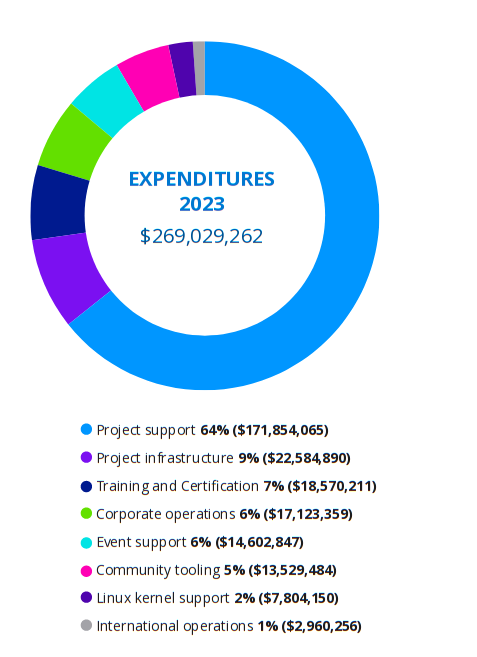Multiple things:
- get rid of mandatory mailinglists
- use a modern git flow without emails
- get the hell off of discord
- don’t make me a “maintainer”. I write code, I love it. Don’t Peter Principle me
- pay me if I’m supposed to care
The goddamn Linux Foundation is investing more into AI than friggin Linux. They could be hiring hundreds of staff to work on Linux with the billions they shove unto AI. What the fuck are they doing? Mozilla is another offender.
Open source foundations with money should be using it to develop open source.
Also, on greybeard conferences: allow virtual participation please? My company isn’t going to give me 4 days off to travel somewhere for one day, have a 2 day conference, then take another day to get back. Nor am I going to pay 200+€ or something as an entrance fee on top of my ticket halfway around the world.
Ironically, I think it’s the younger ones the ones pushing for discord the most. Some projects opened a discord because it actually made it more attractive to young people.
The question is how to make an open source alternative more attractive.
Jesus I guess I’m the outlier. I hate discord so much it’s unreal.
right there with you. when a project/repo advertises discord as it’s primary/sole means of communication between and with developers I let out a big sigh and move on to something else.
Are there particular mediums of conversation that get you excited though?
Honestly, I’ve noticed an uptick in the number of discourse forums for tech related things and I’m all for that. Discourse is documented well and maintained openly, it’s indexable by search engines and you can visit and use discourse-based web forums using browsers that aren’t capable of js rendering (think lynx). The last bit is a nice-to-have for me, but just being indexable is huge.
In 10 years, I would hate it if every answer I gave or got from a developer is lost to an endless abyss of messages buried deep in an obscure discord guild that a user would have to sift through only after making an account with and installing specific chat software. I hate there being so many hurdles in front of just getting answers. That’s a good tl;dr as to why discord is on my shitlist for support/development discussion platforms.
The cheapest tier for Discourse is $50 a month for up to 100 users. https://www.discourse.org/pricing# With self hosting you can probably get that lower at the cost of your time getting it set up and making sure it’s cheaper than the options they provide.
As much as we all collectively roll our eyes when we see Discord being used for community discussion, it makes sense from a maintainer’s point of view.
Edit: Discourse has free options for creators
Eligibility Criteria
We know creators are not created equally, so we split the criteria or requirements to apply across the different creator groups.
- Software creators (GitHub, GitLab): 10+ contributors
Yeah see that’s the sort of conclusive mindset that’s got us here. I don’t mean to insinuate you’re wrong for coming to that conclusion, but “It costs money or effort so let’s use a worse option because it’s convenient” is part of the reason we don’t have a lot of good solutions in this domain.
I’ll also admit the options these days are limited depending on your goals for a project. If you want to reach the most eyes and have the highest draw of potential contributors, having a discord server makes sense. My gripe is when technical discussion or support take place there.
Email!!!
Whenever I see Discord mentioned, I run from it, like a vampire from holy water!
What makes you hate it?
Jesus what’s to like? It’s proprietary software, it has privacy abuses, terrible UI, hate the “servers” thing, consolidated and centralized, no index for search engines, make an account or you’re shit out of luck. It plain fucking sucks.
Matrix has the most potential. It was the most admired communication tool in the stackoverflow survey last year.
You can make a Discord server in like 1 second for free. It’s got mostly good enough tools for managing the community. I get the appeal. If you already use it then it’s super easy to just use it for that too. (Except on Android, where you can’t easily switch accounts. Maybe iPhone has the same problem though.)
Mailing lists are pretty awesome. They’re like a decentralized forum. There are even good web UIs!
That said, submitting and reviewing patches over email suuucks.
And they’re easy to archive. Not super easy to parse, usually, but at least the data is there.
Wrestling to get email to properly bottom post is 99.999% of the battle. (Except the code review, is rather just pull it in locally)
mailing lists
So so true. Mailing lists suck. I’d rather use Discord. (As in I hate mailing lists that much.) Bring back forums!
In 2023 the organization reported significant revenues, totaling approximately $262.6 million.
They are spending BILLIONS on AI!!!
They are doing what they intended to do. It’s just not in line with your agenda.
OK, I was wrong about the billions.
They are doing what they intended to do. It’s just not in line with your agenda.
The Linux Foundation spent 2% on linux kernel support in 2023.

Linux is “my agenda”. It was me who put Linux in the name “Linux Foundation”. Me and me alone. 😂
What does “project support” even stand for?
Edit: ok, apparently it’s helping a bunch of foss projects that are listed in the pdf. I suppose that’s fine.
You just misinterpret their agenda. They were never in line with you
I vote we sacrifice a virgin CS student.
I feel like there’s maybe also a bit of disappointment in open-source going around? The last few years have shown that it’s not the silver bullet, it was thought to be.
Companies will find ways to relicense contributions via CLAs, or to just straight up violate your copyright with GenAI. And even projects that technically tick all the open-source boxes, like Chromium and parts of Android, can and do exert plenty control over users, because no one has the manpower to fork them.
Then there’s plenty unethical companies making use of open-source, and they rarely contribute back to make up for it.
Nevermind that the open-source infrastructure is owned by corporations (GitHub, Discord etc.).And it feels ever more present to me that publishing things as open-source means maintenance work, which can quickly lead to burnout. People just expect you to provide updates, no matter what your license text says.
Like, I certainly don’t either think that not doing open-source is any closer to a solution. But I’m finally at a point where I feel like my code is useful and good enough to publish, and it just feels like either my only ‘users’ are corporations scraping my code, or if I promote it, then it’s just a ton of maintenance work waiting for me.
I don’t know, maybe that’s also just a me-problem…And it feels ever more present to me that publishing things as open-source means maintenance work, which can quickly lead to burnout. People just expect you to provide updates, no matter what your license text says.
David Beazley, big in the python world and one of the OGs of the python ecosystem from back in the 90s, kinda had a moment about this a couple of years ago.
He has or had a few somewhat popular libraries and liked to write things and put them out there. But, IIRC, got fed up of the consumeristic culture that had taken over open source.
I think he put it along the lines of “The kind of open source I’m into is the ‘here’s a cool thing I made, feel free to use it however you want’ kind” … and didn’t have positive things to say about the whole “every open source author is now a brand and vendor” thing.
The result of which, IIRC, was him archiving all of his libraries on GitHub. From a distance, it also seemed like he felt burnt out from a hacking culture in which he no longer felt like he belonged.
deleted by creator
Nobody has been able to adequately explain how ai is violating any oss licenses.
You are explicitly allowed to read the source code.
Really not sure what you’re getting at here.
I replied to you rather than the one you replied to by accident.
I figure business makes quite enough money off my efforts during the day without me also generating value for them for free in the evening.
What can members of the community who can’t code help with?
Depends on your skills. Documentation is always useful. If you have language skills, translation of documentation or helping create language packs/translations.
That’s just off the top of my head. I’m sure if I thought about it, I could come up with more.
If not code or documentation contributions, then well-written bug reports. Seriously, the quality of bug reports sometimes leaves a lot to be desired. And I don’t necessarily mean a full back-trace attached – and please, if you ever send a back-trace, copy-and-paste the text, never a screenshot – but just details like: system details, OS, version, step-by-step instructions to reproduce that a non-coder could also understand, plus what you expected to happen versus what actually happened.
This stuff (usually) comes naturally to programmers and engineers, but users don’t necessarily see things this way. I sometimes think bug reports need to adopt a “so tell me what happened?” approach, where reporters are encouraged to describe free-form what they think of the software, then providing the specific details that developers need. That at least would collect all the relevant details, plus extra details that no developers thought to ask.
Even just having folks that help gather and distill details from user reporters on a forum is easing a burden off of developers, and that effort should be welcomed by any competently-organized project. Many projects already have a template for reports, although it often gets mistaken for boilerplate. Helping reports recognize that they need to fill in all the details is a useful activity that isn’t code or docs.
bug reports need to adopt a “so tell me what happened?” approach
I think, this may be one of the rare cases where use of LLMs may be reasonable. Help user structure their report, then call for a human
The problem I have with bug reports for things like docker containers (I will just use that example for now) is again documentation… I get that most people make really bad “it broke, fix it now” kind of reports with no detail, but unless you actually dig into and know the code, there is often almost no debugging documentation (github issue templates help with that when the devs make one)
Where are the logs? If you refuse to use the docker standard of pushing logs through the log api, don’t respect the LOG_LEVEL environment variable, errors are non-descriptive, and don’t provide documentation to where your logs are stored, how the hell can you expect users to provide relevant logs??
I have run into dozens of pretty big projects that fail with 0 log output and there is 0 log documentation and then the dev auto closes the issue because “not enough logs to help.” The only way to find the logs is to find an old issue where the dev has laid out where the relevant logs are, like WTF? No I am not going to spend an hour looking in every single part of the undocumented directory structure to see if there happen to be logs in there. Use the standard, document your log locations and what they log (no 3ch9qjV7.log is not descriptive enough), or don’t complain about not being able to help without logs.
Thanks! I will look into joining.
Good advice. I want to add the option to offer money or hardware support. Writing helpful Bug Reports is also a good, especially if you really care with testing. Maybe even do Testing of software and functionality, Beta Tester with reports. Less technical would be designing logos or buttons or any graphical activity for documentation and websites, or for the application itself.
Documentation and Bug Reports are probably the top way to help if you can’t code.
If you’re an artist, there’s no shortage of potential open source work. Most FOSS apps have an ugly af GUI.
Either making better assets or better overall design would work.
And so many FOSS apps want nothing to do with good UIs and will be really mean to designers trying to help.
Documentation, bug triage and many other non technical tasks
Can’t or don’t want to?
I got into a project starting out with translations. Then community support. Then wrote a web interface to the desktop/server application. Then got into the project itself.
Many projects have a contributing document or page with pointers. In general, being part of the community, providing information or support, improving documentation, or the bug tracker (reproduction, labeling, discussing/guiding), translating.
What can be done and what makes sense varies a lot depending on project size and popularity too.
Project management. See for instance this talk: https://youtu.be/u3PJaiSpbmc?si=FbQGTfx4nERCb0R-
In 2002 we were firing all our mentors.
The greybeards now burned out from maintaining our foundational stuff have no one who’s learned the 'why’s of best practice under a good mentor, nor have time to donate to open source - and ‘fuck you pay me’ is cute for all the strings it has, btw, but your mentor would have taught you that.
Some of us, worried at distros drinking IBMs (then redhat) kool-aid of badly built shit who raised concerns were labeled ‘just old’; so, like a COVID nurse we said ‘no u’ and focused on other tools and projects.
Things are gonna die. Somewhere in there things will become poorly-maintained. After a dark time of shit massively sucking - and probably another init daemon because blobs are sexy? - it will get better.
But by then apophis will drag our moon into a declining orbit and make us focus on nuking the moon to push it back up.
what do you mean by the Fuck you pay me thing?
You can kinda see this in things like modding communities or anything piracy related too. Users just want easy solutions even if it’s at the expense of creators, and creators are doing it more and more for money rather than any personal drive or satisfaction. I can’t believe we’ve reached a point where even mods are being locked behind paywalls, need to be commissioned or sometimes have entire teams funded by patreon to work on them, it’s just another business nowadays.
I was tempted to disagree, but the Patreon subscription paywalls is a very good point. Are we doing less free work for the public good (or at least accessible to the public), or is it a prevalent niche that’s very visible, without influence on those that volunteer work like before?
The thought I had before that was that maybe the creative output changed. People build in Minecraft and VRChat, in hosted platforms. This may be different to before, where mods were separate things and communities.
I still see a lot of voluntary open work. But I’m not confident in assessing it’s prevalence or shift.
The sad thing is that the last few years was the PERFECT time for open source to see a youth resurgence.
Almost two years ago we saw widespread layoffs across the tech industry, and tens of thousands of young people found themselves without work for long periods of time. Many of them would have killed for an opportunity to spend that time “working” for major open source projects with a small stipend for services provided. Young people can say “I was laid off at Viacom, but worked for the Linux Foundation for 6 months before finding my next role at …”
Hell, you want some hungry talent that would love to work on open source? Target those that are laid off or PIP’d while on visas, and put some legal resources behind supporting their stay in the country while they work on open source, until they find their feet again. Most of them will either go back home or will end up working at predatory consultancy firms that hire L1 or H1 workers that need to stay for their families sake, so take that conveyor belt of talent and put them to work on something useful.
What’s needed is renewed ethos, not just fresh blood.
What’s needed is people who actually like the projects, on the technical level, and use them daily. Not people who are just trying to maintain an open-source “portfolio” they can showcase in pursuit of landing big corpo job.
A “portfolio” which also needs to, in their mind, project certain culture war prioritizations and positionings that are fully inline with the ones corpos are projecting.
It will be interesting to see how much of the facade of morality will remain if these corpo projections change, or when the corpo priorities and positionings, by design, don’t care, at best, about little unimportant stuff like American-uniparty-assisted genocide! We got to see murmurs of that in the last few months.
Will the facade be exposed, or will it simply change face? What if a job was on the line?
I’m reminded of a certain person with the initials S.K, who was a Rust official, and a pretend Windows-user in hopes of landing a Microsoft job (he pretty much said as much). He was also a big culture-war-style moral posturer. And a post-open-source world hypothesiser.
Was it weird for such a supposed moral “progressive” to be a big nu-Microsoft admirer? and one who used his position to push for the idea that anyone who maintained a classical open-source/free-software position towards Microsoft is a fanatic? No, it wasn’t. He was one of many after all.
All these things go hand in hand. And if you think this is a derailing comment that went way off the rails, then I hope you maintain the same position about the effects of all this on the open-source and free-software world itself.
I might have missed if it was in the article. Sorry in advance for that.
Do we have any idea regarding the top 3 or top 5 reasons that drove potential contributors away? Not in terms of hypotheses, asking about actual studies, interviews, surveys, etc
Blood for the blood god?
This is the best summary I could come up with:
True, the Linux Foundation events all now come with child support for young parents, but my expert guestimate is the average age is still well into the 30s.
More specifically, the Cloud Native Computing Foundations (CNCF)'s KubeCons have many tracks for people who want to learn the ins and outs of Kubernetes and other cloud-native programs.
The OSPO for Good conference proposed solutions that have been suggested before, such as hackathons, to engage young developers in open source coding.
As David Nalley, president of the Apache Software Foundation (ASF) and director of open source strategy at Amazon Web Services (AWS), said at the conference: "Getting people to maintain old code isn’t easy.
… I thought if I could hold on just a bit longer, I could help maintain the focus on long term development to improve the user experience.
She also runs the LFX Mentorship program, which seeks to sponsor and train the next generation of open source developers and leaders.
The original article contains 741 words, the summary contains 161 words. Saved 78%. I’m a bot and I’m open source!
Our civilization demands that I be profitable to a parasite who leeches a majority of my labour’s value in order to accumulate obscene levels of wealth.
Without exorbitant amounts of time spent maintaining that profitability, I will end up poor, homeless, and eventually dead from exposure. This leaves vanishingly little time to spend on open source work, regardless of how intellectually and ethically attractive it may be.
But open-source doesn’t always mean working for free, nor does it mean people do it for purely ethical (or socialist?) reason.
There are lots of reason why open-source is attractive after discounting ethics and money. I imagine being credited for being a major contributor to a popular open-source project would mean better job opportunity in the competitive tech job market. The gig doesn’t directly offer you money, but it does gravitate the right company that has the money to fund your work they find very valuable. In a sense, this isn’t that far from how capitalism work – credits are due to the people who brings most value to the society, whether the source of the software are open to all or not.
This is of course a very superficial statement to make, but I remember Eric Raymond wrote about this in more a detailed (and more convincing!) manner in The Cathedral and the Bazaar.
So… it pays in exposure?
deleted by creator
Young people today are struggling to make ends meet - they don’t have enough comfort and free time to be able to donate their labor.
God it’s not even that, the general tech knowledge has just plowed into the ground
That’s true, but that’s also just the general populous, who weren’t ever contributing to open source anyways.
I don’t think the quality of coders (professional or hobby) has really declined that much.oh it definitely has. I’ve been in the industry since last century, the actual poke everything, do this for fun, invest yourself, wild jockey type…well we’re a dying breed.
deleted by creator




















